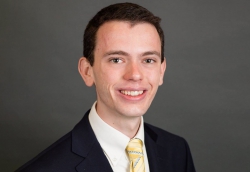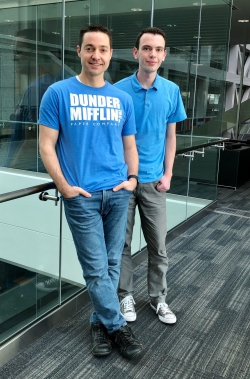Finding Purpose Through Research
PROVO, Utah – Dec 11, 2019 –
When Nate Burton reads books, magazines, or content on the internet, he is constantly looking for future research opportunities.
“When I find something interesting, I write it down. Sometimes it's not something that's easy to do research about, but that's not something I consider when I first start,” says Burton. “Once I have a pretty good list, I narrow it down to research questions that are possible to answer as well as useful for people to know.”
Once Burton, a BYU Marriott MISM student from Kaysville, Utah, has narrowed his ideas down, he brings his growing list of research ideas to information systems associate professor James Gaskin for further guidance. Burton primarily works with Gaskin as a research assistant on the ideas Burton has found. Together, they recently published a study that looks at whether digital assistants such as Siri, Alexa, and Google Assistant make us less polite.
“I never would have thought of a tenth of the ideas Nate has come up with. But now that we're working together, I get to be part of them,” says Gaskin. “Every time I engage with a student who feels empowered to share their ideas, and is not afraid to share them, my point of view opens up, allowing me to see things in different ways and research topics I never would have considered before.”
In addition to working with Gaskin, Burton is currently working with IS assistant professor Jeff Jenkins and assistant professor David Eargle of University of Colorado Boulder on the correlation between personal digital security and tiredness. “For this project, we are researching how people respond to warnings from computers and how being tired affects the security decisions someone might make such as passwords or security questions,” says Burton.
This cybersecurity fatigue study is in the early phases, but Burton is excited to collaborate with Jenkins and Ergo. “Nate is a talented student who does a great job taking initiative and heading up research projects like this one,” says Jenkins.
Burton attributes his ability to research effectively to what he’s learned in the IS program at BYU Marriott. “The IS program has taught and continues to teach me how to analyze data. In order to be published, it’s critical to be clear and straightforward when writing up research, and the program has taught me to do just that,” says Burton.
While now confident in his future career path, Burton was not always so sure about information systems. When he first set foot on BYU campus, he was not sure how to mix his interests of music, social sciences, math, and science. While many majors provide opportunities to research and teach, Burton was drawn to IS because it combined the social sciences, math, and science aspects he was looking for.
“I knew I wanted to do something with technology, but I'm not one of those people who can sit around and do math or programming all day,” says Burton. “Information systems felt like a good synthesis of both the analytical side of me as well the social side of me that gets to work with people.”
As for music, it’s a hobby Burton keeps up on the side. “I've learned to play the guitar while I've been in college, and I’ve been teaching myself to compose music,” says Burton. “That's something that interests me, because it's also a deep-thinking experience to try and compose music.”
In addition to working as a research assistant, Burton is a teaching assistant for IS 401 Systems Analysis and Design. “Trying to help people is important to me. Being a teaching assistant is a way for me to help people while teaching me how to be a good teacher,” says Burton. “I’m passionate about research and teaching, and I want to pursue both. My next step is applying to schools to earn my PhD.”
Being both a teaching and a research assistant at BYU Marriott has given Burton a taste of what he wants to pursue in the future, and he hopes these experiences distinguish him from other prospective PhD candidates.
“A certain reputation comes with being a BYU graduate when applying for a PhD program, simply because schools know we come ready to research. Since BYU doesn't have PhD programs for all their majors, they use undergraduate and graduate students to fill that need,” says Burton. “This means students have opportunities to learn and are better prepared to succeed in that setting.”
As for now, Burton hopes to continue research focusing on the human aspect of computers. “Research allows me to help people learn more about the world and empower them to make better decisions in their lives. As a researcher, you're trying to show people the truth about the world,” says Burton. “Research gives me purpose.”
Media Contact: Chad Little (801) 422-1512
Writer: Kate Monroe





